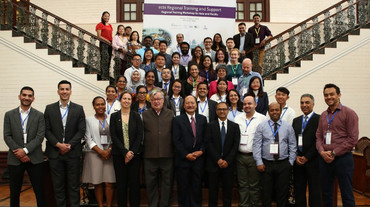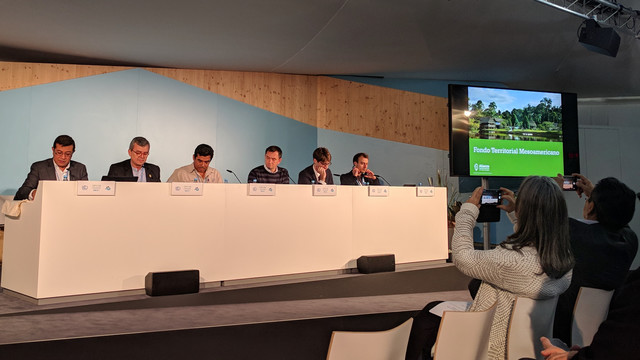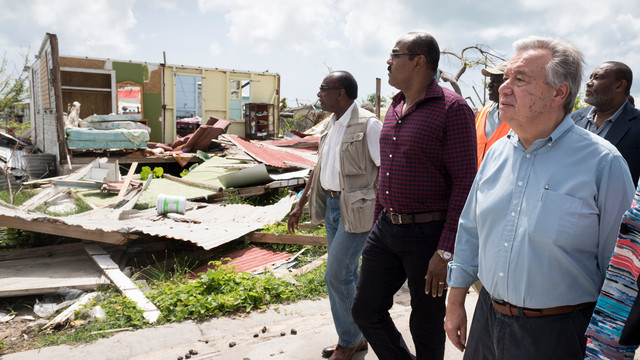Negotiators from developing countries get skills boost ahead of UN climate talks
More than 40 climate negotiators from vulnerable developing countries were briefed on key issues and negotiating strategies at a workshop just before the opening of the Bonn climate talks.

Workshop participants were briefed on the climate negotiating priorities of the Least Developed Countries (Photo: Matt Wright/IIED)
The workshop participants included new negotiators and officials from more than 25 countries. They were briefed by leading climate negotiators and ambassadors, as well as legal advisors.
The training workshop took place two days before the start of the 2017 global climate talks. The 23rd Conference of Parties (COP23) to the UN Framework Convention on Climate Change (UNFCCC) is taking place from 6-17 November in Bonn, Germany, and will bring together up to 20,000 official delegates and their advisors, lobbyists, commentators and NGO representatives. The focus of this year's conference is how to implement the landmark 2015 Paris Agreement on combating climate change.
The pre-COP workshop in Bonn on 4 November 2017 was designed to help developing country negotiators and policymakers by outlining the key processes and issues. It was organised as part of the European Capacity Building Initiative (ecbi), a joint programme designed to develop skills and capacity among developing country negotiators and to foster trust between different negotiating groups. The ecbi training and support programme is managed by the International Institute for Environment and Development (IIED) and Oxford Climate Policy.
The workshop opened with a session led by Gebru Jember Endalew, the chair of the Least Developed Countries (LDC) Group at the UNFCCC negotiations. The LDC Group represents the 47 nations that are especially vulnerable to climate change but have done the least to cause the problem.
Endalew himself has benefited from the work of the ecbi programme in supporting delegates from vulnerable countries. He said: "I started in 2008 in a regional workshop in Botswana, and immediately I was supported by ecbi's bursary programme for Poznan [COP14]. I was a bit confused, but I had senior negotiators coaching us and doing ecbi pre-COP workshops, so we were able to get a better picture and had an advantage compared to others who were just diving into the negotiations.
He said the briefings prepared by IIED for LDC negotiators helped them to build their skills: "Actually we benefited a lot from syntheses reports, and we make use of that to capacitate our service. I am very grateful, otherwise it could have been a bit difficult."
Gebru said that many of the LDC coordinators had passed through the ecbi programme, and praised the long-term nature of the support. He said: "Even if you look at Pa Ousman [Jarju], former LDC Group chair, he started through ecbi courses, and myself, and a number of coordinators who have come through these courses.
"For the last eight or nine years I have been supported by IIED without interruption. So that makes for consistency in terms of engagement in the process. If I was supported by government, sometimes you may not have a chance to be engaged because focal points change from one time to the other.
"It could be a bit difficult to be engaged in the process for nearly 10 years if I was not supported by IIED. I think that's the point we need to recognise about this initiative. It would have been really a very big vacuum from the LDCs' perspective if such support couldn't have been provided."
Endalew said this year the LDC Group is focusing on ensuring the voice of the group is better heard in the negotiations. He discussed the LDC Group's preparations for COP23 in a recent blog.
The workshop participants were also briefed by IIED principal researcher Achala Abeysinghe, legal and strategic advisor to the LDC Group. She stressed the importance of long-term engagement with developing country officials, noting that this was IIED's 12th pre-COP workshop.
One negotiator at the workshop at the start of their journey was Xaysomphone Souvannavong, of the Lao People's Democratic Republic: "This is my second workshop [with IIED and ecbi]," she said. "I worked with them earlier in Sri Lanka, and this helped me know the whole process of the COP, and over the last week – at the preparation meeting of the LDC and G77 and China groups – it's helped me a lot.
"The workshop helped me focus on what our priorities are as an LDC Group: we must stick together – as a team our voice will be louder."
She added: "The interesting part of this workshop, beside the political themes and content, was the tips for negotiation: how to read the language and how to negotiate using effective language. This was particularly helpful because I'm not a native English speaker and it's difficult to listen and talk in English."
Souvannavong was provided with a bursary to attend the workshop and COP23, and said she was grateful for the opportunity to gain experience: "I came across [the bursary] during the workshop in Sri Lanka. For myself, I made the case that my delegation was mostly men, so if selected I would be the only woman in the team. This helps me because at home I help with the COP preparation, and the high-level statement, and this gives me the chance to have the feeling of what COP is really like."
Regional support and briefing documents
The ecbi training and support programme also delivers regional workshops to help officials from vulnerable countries participate in the UNFCCC decision-making process and translate its outcomes into national level implementation. These regional workshops foster collaboration in targeted regions and help ensure climate change issues become part of mainstream thinking across government ministries. They enable negotiators to meet, exchange views, and plan together.
This year the programme delivered regional training workshops in Dakar, Senegal for Anglophone African countries (5-6 June, 2017) and Francophone African officials (8-9 June, 2017).

IIED also works in other ways to strengthen the position of Least Developed Countries in international climate negotiations. In collaboration with OCP, the institute has produced a number of briefings for new delegates to the UN climate talks, including the 'Pocket guide to the Paris Agreement', and the 'Pocket guide to capacity building for climate change'. One of IIED's most popular publications at COP21 in Paris in 2015 was 'Becoming a UNFCCC delegate: what you need to know'.




